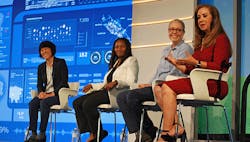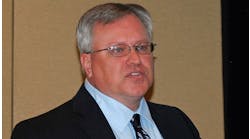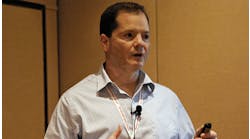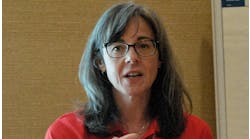A diverse panel of women in technology discussed progress toward building a more representative and inclusive culture in the technical sector and suggested ways that we can all advance the cause. Participants included (from left) Ethel Nakano of Suncor; Jakira Jekayinfa-Brown of East Bay Municipal District; Tammie Borders of Quantinuum; and Veronica Turner of Honeywell. Not pictured is host and moderator Carrie Sinclair, also of Honeywell.
“I go to these conferences, and I look to the left, I look to the right, and no one looks like me,” said Jakira Jekayinfa-Brown, associate electrical engineer for East Bay Municipal Utility District in Oakland, California, at the start of a luncheon panel discussion on Women in Technology at this week’s Honeywell User Group (HUG) Americas 2022.
She was joined on stage by host Carrie Sinclair, vice president of customer marketing for performance materials and technologies at Honeywell, and panelists Ethel Nakano, general manager of Syncrude projects for Suncor; Tammie Borders, senior government relations manager at Quantinuum; and Veronica Turner, sales lead for safety solutions with Honeywell Process Solutions. While the panel of women was quite diverse, that’s not replicated for the most part in technology sectors, and the panelists discussed what it’s like always being in the minority and how has the conversation about women has changed over their careers.
“What ignites my passion are the possibilities and the technology that lies ahead,” Jekayinfa-Brown said. As scary as it might be for her to not see others that look like her, she knows, “I’m exactly where I need to be.”
“I know that means the glass ceiling has not been broken, and it’s exciting to know that I get to be a part of that team that breaks it,” Jekayinfa-Brown said. “We will start to be able to come up with better solutions and better technologies that are a reflection of everybody.”
The talented and experienced group of women have worked in many different areas of technology, and they also shared their thoughts on digital transformation and other industry trends.
While most conference attendees already work with a good base of digital technology, Nakano said, the industry is still doing a lot of operations manually. “I think there’s a lot of opportunity there,” she said, by spending time looking at insights from the data. “Where can I use this technology to solve bigger problems?”
Four out of 10 incidents in industrial plants are caused by human error, Turner added. “We’re not replacing the human worker; we’re enabling the human worker to do his or her job in a better way,” she said.
Cultural transformation needed
In addition to technology updates, digital transformation also needs culture change. Before working in quantum computing, Borders spent most of her career in digital transformation, working at Lockheed Martin on materials innovation for the Joint Strike Fighter program, developing air-grade polymers for primary and secondary structures. “I will never forget the day I walked out to the flightline, and one of the guys said to me, ‘We will never fly on a plastic airplane’,” she said. Talking all day about why that wasn’t a plastic airplane wouldn’t necessarily change perceptions, she said. “So what we have to do is talk to people, educate people, train people,” Borders said. “It’s not just using the tools. There’s a cultural shift required for acceptance, so you need to start those conversations.”
Returning to the gender focus, Sinclair asked the panelists about how the conversation about women has changed over their careers. When Nakano was in school 30 years ago, she said, females represented about 20% of the student body, but in the working environment and in higher degree programs, that number dropped off significantly. “Going forward 30 years, I thought, quite frankly, we would be in a better place,” Nakano said. “But when you look around this room, which is a technical conference, we are not equally represented in terms of attendance.”
Jekayinfa-Brown said she has been fortunate to work for a company that supports diversity and strives to recruit and retain diverse talent. “So for me, in my group and my organization, there’s just as many women as there are men in our group, and just as many people of color,” she said.
Prior to her current role, Borders worked in nuclear non-proliferation, as a technical advisor for a large portfolio of next-gen artificial intelligence developers. “With our portfolios we made a conscious effort to drive inclusive diversity,” Borders said, including webinars and group discussions on the topic. “It was changing the dynamic of how people engaged. It was changing the outcome.”
Be open, take initiative
Turner is from Ecuador and came to the U.S. as an adult. “I needed to make sure that my voice was heard, and that despite everything that was around me, I was seen, that besides my gender, I was seen as an intelligent brain.” Turner also leads the Honeywell Hispanic employee network, one of seven women networks for different ethnicities and sexual orientations. “You don’t have to be a woman to be in the women’s network,” Turner said. “You just have to believe in promoting women.” The groups work to make sure that great women employees not only stay at the company on a solid career path but that they also serve as mentors and role models for other women.
Sinclair, who sits on several of the women’s groups, said they talk a lot about allyship, and she asked the panelists how allies can help women in technology.
Nakano said that in thinking about allies, think broader. “An ally is not just someone that looks like you. An ally could be someone that’s different that supports you,” she said. “Then, also be aware of any of those unconscious biases that are out there.”
The group encouraged those in the audience to become allies to the women in their groups. “Step up and defend,” Nakano said. “If there’s something that you’re not comfortable with, it’s probably something other people are not comfortable with.”
“I think first off being aware that there’s an issue,” Jekayinfa-Brown added. “And if you’re not aware there’s an issue, be open to listening to that conversation to figure out how you can be part of the solution.” She also said it’s important to be open to having those uncomfortable conversations.
The editors of Control, Control Design and Smart Industry are reporting live from 2022 Honeywell Users Group in Orlando, Florida, to bring you the latest news and insights from the event. When the event comes to a close, the best, most important coverage will be compiled into a report by the editors.
Register now to pre-order the report and be among the first to receive it in your inbox.





